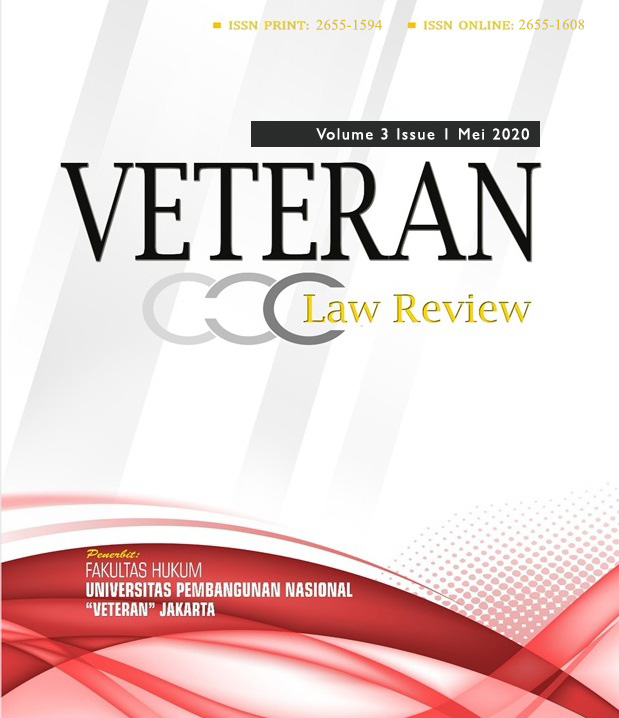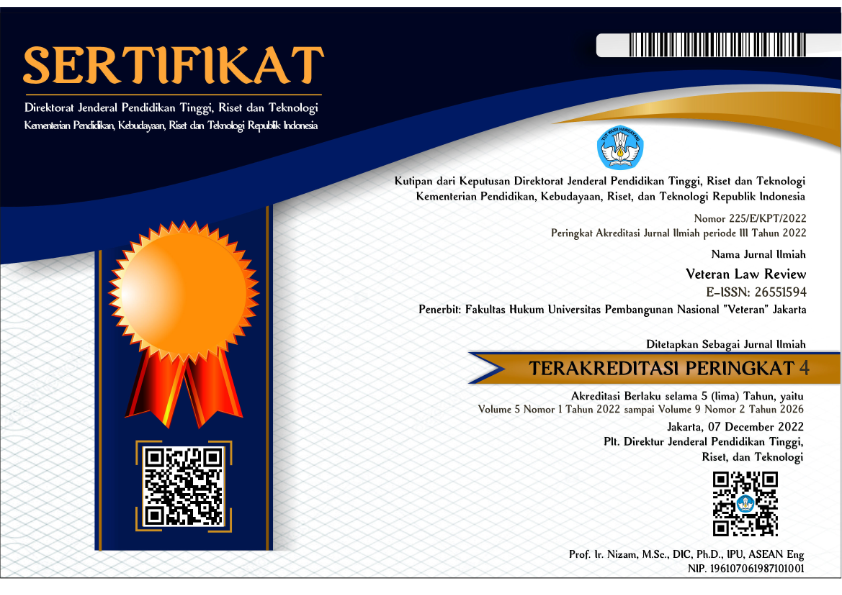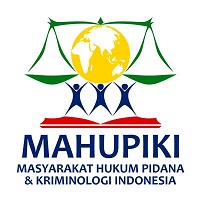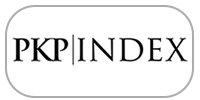Provision of Rehabilitation of Drug Addicted Children as a Form of Fulfillment of Constitutional Rights
DOI:
https://doi.org/10.35586/velrev.v3i1.1563Abstract
The aim of this research is to find out rehabilitation both in the form of medical and social assistance given to minors as addicts to narcotics, which can endanger lives and bodies, so that by carrying out rehabilitation gradually the child can return to the original condition with the recovery he has obtained. Besides giving in rehabilitation is a form of recognition and appreciation for the constitutional rights of citizens, where these rights are constitutional rights that have been contained in the 1945 constitution and those rights are rights protected by the government, and the state is also law, rights that are constitutional here in relation to is the right to health and the right to adequate housing, and the existence of integrated recovery both physically, mentally and socially so that children as addicts of narcotics can be accepted again in society, bearing in mind that children are the buds of the nation which will carry forward the ideals and struggle of the nation, so that it must be restored to the condition of the psyche and his health, because by restoring his condition will return to carry out activities or activities in gaining knowledge by learning, getting education and playing with his friends as usual, it can be said that the child as an addict from narcotics has returned to his normal environment and made a process of interaction in general . The formulation of the problem to be examined is whether the provision of rehabilitation of children as addicts of narcotics is part of the realization and recognition of constitutional rights in accordance with the constitution of the constitution by 1945. The method in this study uses juridical and normative that is using literature related to the problem to be investigated and can answer existing problems, where the results are that medical and social rehabilitation given to children as addicts of narcotics can provide recovery and return it to the psychological condition in a psychological way. integrated through physical, psychological and social health, and this is also a guarantee and protection from the government in fulfilling its constitutional rights as citizens, because by fulfilling the guarantee and recognition including the protection of children's rights, protection of the rights the most essential is the protection of the rights in his life to obtain opportunities in education and also health and play.keywords ; rehabilitation, children, narcotics, constitutional rights
Downloads
References
Book
Djamil, M. Nasir, (2013), Anak Bukan Untuk Dihukum, Jakarta: Sinar Grafika
Ellydar, Chaidir, (2007), Hukum dan Teori Konstirusi, Yogyakarta : Kreasi Total Media
Mardani, (2005), Penyalahgunaan Narkotika Dalam Perspektif Hukum Pidana Islam dan Hukum Pidana Nasional, Jakarta : Raja Grafindo
Marzuki, Peter Mahmud, (2009), Penelitian Hukum, Jakarta : Kencana
Prawoto, Budi dan Intari Dyah Pramudita, (2008), Narkotika dan Zat Adiktif, Jakarta : Sinar Grafika
Prodjodikoro, Wiryono, (2003) Tindak-Tindak Pidana Tertentu Di Indonesia, Bandung : Refika Aditama
Rahardjo, Satjipto, (2009), Penegakan Hukum Suatu Tinjauan Sosiologis, Yogyakarta : Genta Publishing
S. Amdinat, (2005), Upaya Pencegahan Narkoba Terhadap Anak Didik, Pekan baru : UNRI Press
Kusno, Adi, (2009), Kebijakan Kriminal Dalam Penanggulangan Tindak Pidana narkotika Oleh Anak, Malang : UMM Press
Journal
Andriansyah, Yuli, Lalu Abdurrahman, Penyuluhan Pencegahan Bahaya Narkoba Terhadap Anak-Anak Usia Dini, (2013), Jurnal Inovasi dan Kewirausahaan, 2 (2), Seri Pengabdian Masyarakat
Hidayat, Asep Syarifuddin, Samul Anam, Muhammad Ishar Helmi, (201*), Perlindungan Hukum Terhadap Anak Sebagai Kurir Narkotika, SALAM ; Jurnal Sosial dan Budaya Syar-i, 5 (3)
Novitasari, Dina, (2017), Rehabilitasi Terhadap Anak Korban Penyalahgunaan Narkoba, Jurnal Hukum Khaira Ummah, 12 (4)
Purwatiningsih, Sri, Penyalahgunaan Narkoba Di Indonesia, (2001), Populasi Jurnal Kependudukan dan Kebijakan Universitas Gadjah Mada, 12 (1)
Internet
https://www.galamedianews.com/?arsip=214151, “Dampak Negatif Penyalahgunaan Narkoba”, diakses, 24 Januari 2020
https://www.hariansilampari.co.id/ratusan-remaja-direhabilitasi-narkoba/ “ratusan remaja direhabilitasi narkoba” diakses 26 Januari 2020
Legislation
Undang-Undang Nomor 39 Tahun 1999 Tentang Hak Asasi Manusia
Undang-Undang Nomor 35 Tahun 2009 Tentang Narkotika
Undang-Undang Nomor 11 Tahun 2012 Tentang Sistem Peradilan Pidana Anak (SPPA)
Undang-Undang Nomor 35 Tahun 2014 Tentang Perubahan Undang-Undang Nomor 23 Tahun 2002 Tentang Perlindungan Anak
Downloads
Published
How to Cite
Issue
Section
License
Copyright (c) 2022 Veteran Law Review Journal
Veteran Law Review © 2022 by Faculty of Law Universitas Pembangunan Nasional "Veteran" Jakarta is licensed under Creative Commons Attribution 4.0 International

1. License
The non-commercial use of the article will be governed by the Creative Commons Attribution license as currently displayed on Creative Commons Attribution 4.0 International.
2. Author(s)' Warranties
The author warrants that the article is original, written by the stated author(s), has not been published before, contains no unlawful statements, does not infringe the rights of others, is subject to copyright that is vested exclusively in the author, and free of any third party rights, and that any necessary written permissions to quote from other sources have been obtained by the author(s).
3. User/Public Rights
VELREV's spirit is to disseminate articles published are as free as possible. Under the Creative Commons Attribution-ShareAlike 4.0 International License. VELREV permits users to copy, distribute, display, and perform the work for non-commercial purposes only. Users will also need to attribute authors and VELREV to distributing works in the journal and other media of publications.
4. Rights of Authors
Authors retain all their rights to the published works, such as (but not limited to) the following rights;
- Reproduce the work
- Prepare derivative works based upon the work
- Distribute copies of the work
- Perform the work publicly
- Display the work publicly
- Copyright and other proprietary rights relating to the article, such as patent rights,
- The right to self-archive the article,
- The right to enter into separate, additional contractual arrangements for the non-exclusive distribution of the article's published version (e.g., post it to an institutional repository or publish it in a book), with an acknowledgement of its initial publication in this journal (Veteran Law Review).
5. Co-Authorship
If the article was jointly prepared by more than one author, any author submitting the manuscript warrants that he/she has been authorized by all co-authors to be agreed on this copyright and license notice (agreement) on their behalf, and agrees to inform his/her co-authors of the terms of this policy. VELREV will not be held liable for anything that may arise due to the author's internal dispute. VELREV will only communicate with the corresponding author.
6. Royalties
Being an open accessed journal and disseminating articles for free under the Creative Commons license term mentioned, author(s) are aware that VELREV entitles the author(s) to no royalties or other fees.
7. Miscellaneous
VELREV will publish the article (or have it published) in the journal if the article’s editorial process is successfully completed. JOSI's editors may modify the article to a style of punctuation, spelling, capitalization, referencing, and usage that deems appropriate. The author acknowledges that the article may be published so that it will be publicly accessible and such access will be free of charge for the readers as mentioned in point 3.


















